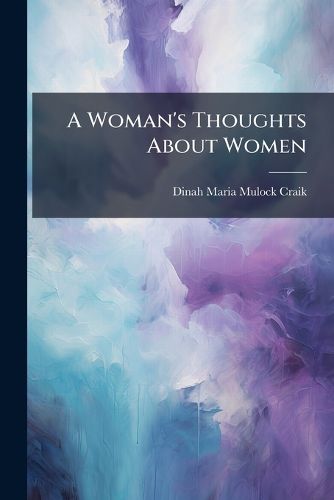Readings Newsletter
Become a Readings Member to make your shopping experience even easier.
Sign in or sign up for free!
You’re not far away from qualifying for FREE standard shipping within Australia
You’ve qualified for FREE standard shipping within Australia
The cart is loading…






A Woman's Thoughts About Women, penned by Dinah Maria Mulock Craik, the celebrated author of "John Halifax, Gentleman", offers insightful reflections on the lives, roles, and societal expectations of women in the Victorian era. This collection of essays delves into a range of topics pertinent to women's experiences, from marriage and motherhood to education and independence. Craik's work provides a valuable window into the social dynamics and evolving perspectives on women's issues during a transformative period in history.
With keen observations and thoughtful analysis, Craik explores the complexities of womanhood, challenging conventional norms and advocating for greater understanding and equality. "A Woman's Thoughts About Women" remains a relevant and compelling read, offering timeless insights into the ongoing dialogue surrounding women's rights and societal roles.
This work has been selected by scholars as being culturally important, and is part of the knowledge base of civilization as we know it. This work was reproduced from the original artifact, and remains as true to the original work as possible. Therefore, you will see the original copyright references, library stamps (as most of these works have been housed in our most important libraries around the world), and other notations in the work.
This work is in the public domain in the United States of America, and possibly other nations. Within the United States, you may freely copy and distribute this work, as no entity (individual or corporate) has a copyright on the body of the work.
As a reproduction of a historical artifact, this work may contain missing or blurred pages, poor pictures, errant marks, etc. Scholars believe, and we concur, that this work is important enough to be preserved, reproduced, and made generally available to the public. We appreciate your support of the preservation process, and thank you for being an important part of keeping this knowledge alive and relevant.
$9.00 standard shipping within Australia
FREE standard shipping within Australia for orders over $100.00
Express & International shipping calculated at checkout
A Woman's Thoughts About Women, penned by Dinah Maria Mulock Craik, the celebrated author of "John Halifax, Gentleman", offers insightful reflections on the lives, roles, and societal expectations of women in the Victorian era. This collection of essays delves into a range of topics pertinent to women's experiences, from marriage and motherhood to education and independence. Craik's work provides a valuable window into the social dynamics and evolving perspectives on women's issues during a transformative period in history.
With keen observations and thoughtful analysis, Craik explores the complexities of womanhood, challenging conventional norms and advocating for greater understanding and equality. "A Woman's Thoughts About Women" remains a relevant and compelling read, offering timeless insights into the ongoing dialogue surrounding women's rights and societal roles.
This work has been selected by scholars as being culturally important, and is part of the knowledge base of civilization as we know it. This work was reproduced from the original artifact, and remains as true to the original work as possible. Therefore, you will see the original copyright references, library stamps (as most of these works have been housed in our most important libraries around the world), and other notations in the work.
This work is in the public domain in the United States of America, and possibly other nations. Within the United States, you may freely copy and distribute this work, as no entity (individual or corporate) has a copyright on the body of the work.
As a reproduction of a historical artifact, this work may contain missing or blurred pages, poor pictures, errant marks, etc. Scholars believe, and we concur, that this work is important enough to be preserved, reproduced, and made generally available to the public. We appreciate your support of the preservation process, and thank you for being an important part of keeping this knowledge alive and relevant.